
After the recent incident of fire in the vessel Maersk Frankfurt, the shipping line has declared General Average and have appointed Mr Richards Hogg Lindley as G.A Adjuster, now what on Earth the general Average means in shipping terms?
General Average is a principle of maritime law where all stakeholders in a sea voyage—typically the shipowner, cargo owners, and sometimes charterers—share the costs associated with a voluntary sacrifice made to save the entire venture in an emergency. This concept dates back to ancient times and remains relevant today, ensuring fairness and collective responsibility.
When is General Average Declared?
GA is declared in situations where:
- There is a common peril threatening the entire venture (e.g., fire, storm).
- A voluntary sacrifice is made to save the ship and cargo (e.g., jettisoning cargo, incurring extraordinary salvage costs).
For instance, if a fire breaks out on a vessel and some cargo is jettisoned or extraordinary expenses are incurred to extinguish the fire, the shipowner may declare GA. This means that all cargo owners must contribute to the losses and expenses, not just those whose cargo was sacrificed.
The Process of General Average
- Declaration: The shipowner officially declares GA following the emergency.
- Appointing Adjusters: GA adjusters, like Richards Hogg Lindley, are appointed to manage the adjustment process, assessing values and determining contributions from each party.
- Collection of Securities: Before cargo is released, GA securities (bonds or guarantees) are collected from cargo owners to ensure they will contribute their share.
- Adjustment: Adjusters calculate the total GA amount and each party’s contribution based on the value of their cargo.
- Settlement: Contributions are collected, and the reimbursed amounts cover the initial sacrifices or expenses.
What Should Cargo Owners Do?
- Notify Insurance: Inform your cargo insurance provider immediately. Most marine insurance policies cover GA contributions, meaning your insurer will handle much of the process.
- Gather Documentation: Ensure all relevant shipment documents are ready, including the Bill of Lading, commercial invoice, and packing list.
- Follow Adjuster Instructions: Be prepared to provide GA securities and follow the adjusters’ guidelines for the process.
- Stay Informed: Maintain regular communication with the shipping line and GA adjusters for updates on the condition of the cargo and the progress of the adjustment.
Why General Average Matters
GA ensures that the costs of extraordinary measures taken to save a maritime venture are shared fairly among all stakeholders. This principle protects both the shipowner and the cargo owners, distributing the financial burden of emergency actions across all parties involved.
Conclusion
Sailon: General Average is a crucial mechanism in maritime law, ensuring collective responsibility and fairness in the face of emergencies at sea. For cargo owners, understanding GA and being prepared for its implications is essential. By notifying your insurer, gathering necessary documentation, and following the adjusters’ instructions, you can navigate the GA process smoothly and ensure that your interests are protected.
Stay informed and proactive, and remember, in the world of maritime trade, preparedness is key.



